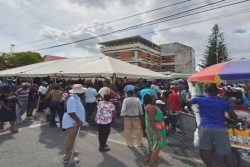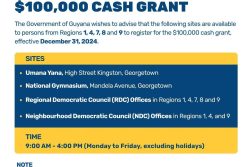Since the unveiling of the new Barbadian policy on undocumented Caricom citizens which was styled as an “amnesty” but is anything but that, there have been frequent reports that Barbadian immigration workers and security forces have been rounding up illegals in the most uncivilized manner and depositing them at the Grantley Adams Airport for immediate return to this country.
President Jagdeo at a press conference had been asked about this issue and his reply was that he had raised the matter with Prime Minister Thompson of Barbados and his response was that he was not aware of any such raids. It is quite possible that Prime Minister Thompson is unaware of such activities directed against Guyanese and others but given recent detailed reports the Prime Minister would be well advised to actively seek out information on whether his immigration and security forces are engaged in dawn crackdowns against illegals while they are still asleep. The same goes for President Jagdeo. Such crackdowns are unbecoming of an orderly democratic society and a member of a community of nations.
Illegal Guyanese and others in Barbados who don’t meet the onerous conditions set by the Thompson administration’s amnesty are now an extremely vulnerable group and are prone to even more grotesque forms of exploitation and abuse in the hope that they can avoid being cast out of Bridgetown. Many may have already been put out from Barbados under dehumanizing and extreme circumstances but may not want to expose this because of the fear of embarrassment and stigma. Many more are however at risk and this is what should concern the Government here and the Georgetown-headquartered Caricom.
Stabroek News has recently spoken to two Guyanese – a man and a woman – who were unceremoniously removed from Barbados. They narrated being rounded up in the early morning in the midst of sleep and harried in the stupor of being half awake to get themselves and possessions together to be hurriedly removed from the Land of the Flying Fish. Their accounts revealed no opportunity to tidy up their affairs, gather all of their belongings or prepare themselves for the return home.
This cannot – must not – be the manner in which a regional sister nation treats illegals. All those in violation of the laws of Barbados must be brought to book. The normative behaviour in our community of nations is for those who have overstayed their welcome or transgressed the law in any other way to have their day in court. This certainly did not happen in the two cases drawn to the attention of this newspaper and one can only surmise that there are more of these.
Considering the thousands of Guyanese who may now be exposed to this fate, the Government of Guyana’s stance has been remarkably laid back. One hopes that there has been a lot of quiet diplomacy behind the scenes to bring some order and dignity to the repatriation of Guyanese but there is yet no evidence of this from the Office of the President, Takuba Lodge or Guyana’s Honorary Consul in Barbados. There may also be some uneasiness in the government here on the lengths that Guyanese are willing to go and the privations they are prepared to endure in the quest for a better life outside of Guyana even if illegally.
Surely, the Chief Immigration Officer, who is also the Commissioner of Police is now in possession of statistics on the number of Guyanese who have been returned here from Barbados and whether deported or not. Those persons should be interviewed, if willing, by the Ministry of Foreign Affairs. Such information can then be the basis for the Jagdeo administration to dialogue with the Thompson government on easing the pain of the illegals. This conversation shouldn’t even await the upcoming summit of heads here.
Bridgetown is clearly in the right to enforce its national laws and remove aliens who have no documentation or have transgressed the law. It must however do this without humiliating the very people who have provided service to its economy. These persons are entitled to due process, reasonable time to transfer their belongings acquired over a significant period and to prepare themselves for the return.
The UN Convention on Migrant Workers which Guyana has signed and several other Caricom states have ratified but which Barbados has shunned says inter alia in Article 16
7. When a migrant worker or a member of his or her family is arrested or committed to prison or custody pending trial or is detained in any other manner:
(a) The consular or diplomatic authorities of his or her State of origin or of a State representing the interests of that State shall, if he or she so requests, be informed without delay of his or her arrest or detention and of the reasons therefor;
(b) The person concerned shall have the right to communicate with the said authorities. Any communication by the person concerned to the said authorities shall be forwarded without delay, and he or she shall also have the right to receive communications sent by the said authorities without delay;
(c) The person concerned shall be informed without delay of this right and of rights deriving from relevant treaties, if any, applicable between the States concerned, to correspond and to meet with representatives of the said authorities and to make arrangements with them for his or her legal representation.
8. Migrant workers and members of their families who are deprived of their liberty by arrest or detention shall be entitled to take proceedings before a court, in order that that court may decide without delay on the lawfulness of their detention and order their release if the detention is not lawful. When they attend such proceedings, they shall have the assistance, if necessary without cost to them, of an interpreter, if they cannot understand or speak the language used.
And Article 17
1. Migrant workers and members of their families who are deprived of their liberty shall be treated with humanity and with respect for the inherent dignity of the human person and for their cultural identity.
2. Accused migrant workers and members of their families shall, save in exceptional circumstances, be separated from convicted persons and shall be subject to separate treatment appropriate to their status as unconvicted persons. Accused juvenile persons shall be separated from adults and brought as speedily as possible for adjudication.
3. Any migrant worker or member of his or her family who is detained in a State of transit or in a State of employment for violation of provisions relating to migration shall be held, in so far as practicable, separately from convicted persons or persons detained pending trial.
Perhaps Article 45 of the Revised Treaty of Chaguaramas wherein it is stated that Member States commit themselves to the goal of free movement of their nationals within the Community is merely aspirational and far from ever being concluded. It is still no reason for Barbados to treat fellow brothers and sisters in this unacceptable manner.





